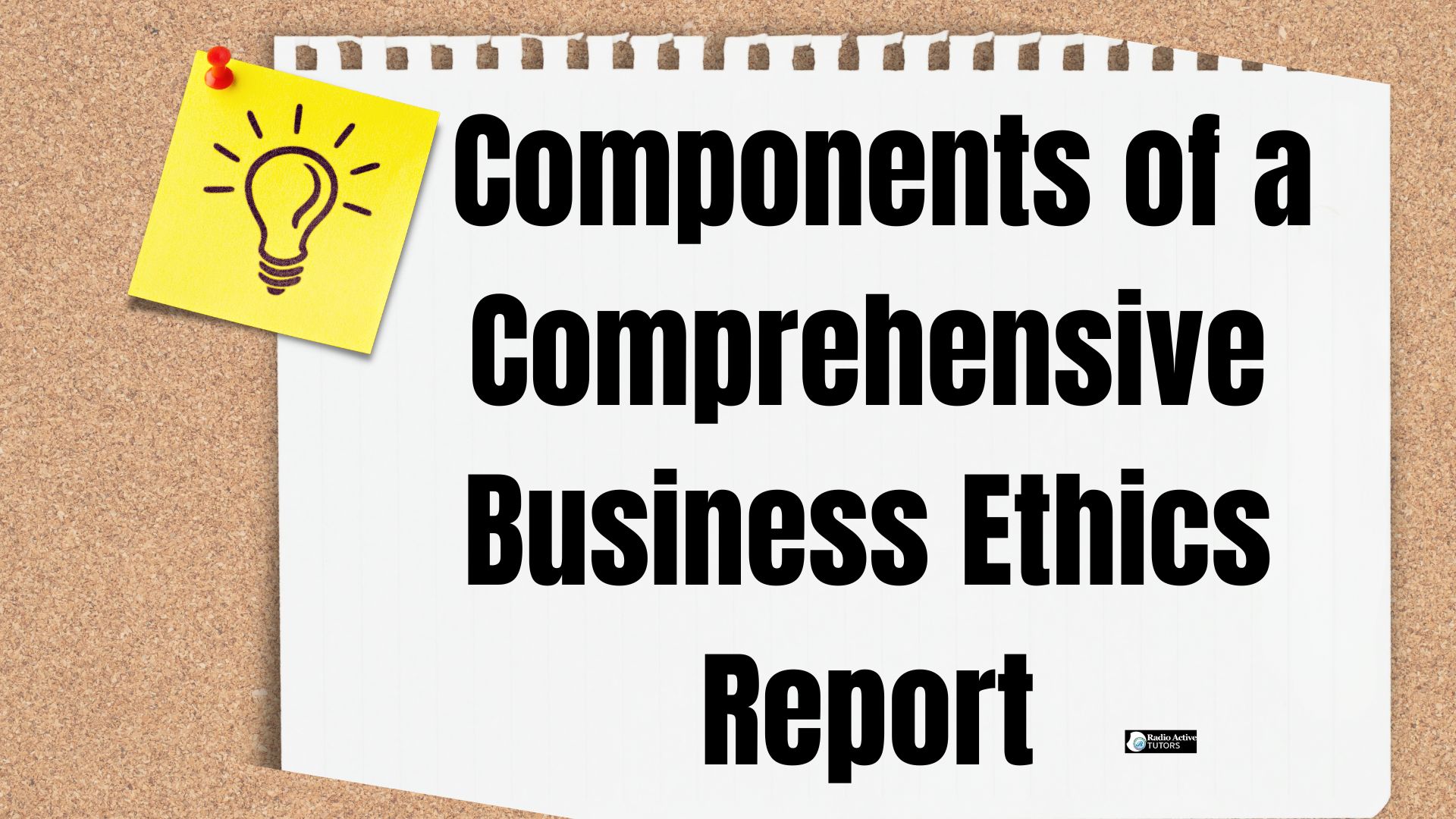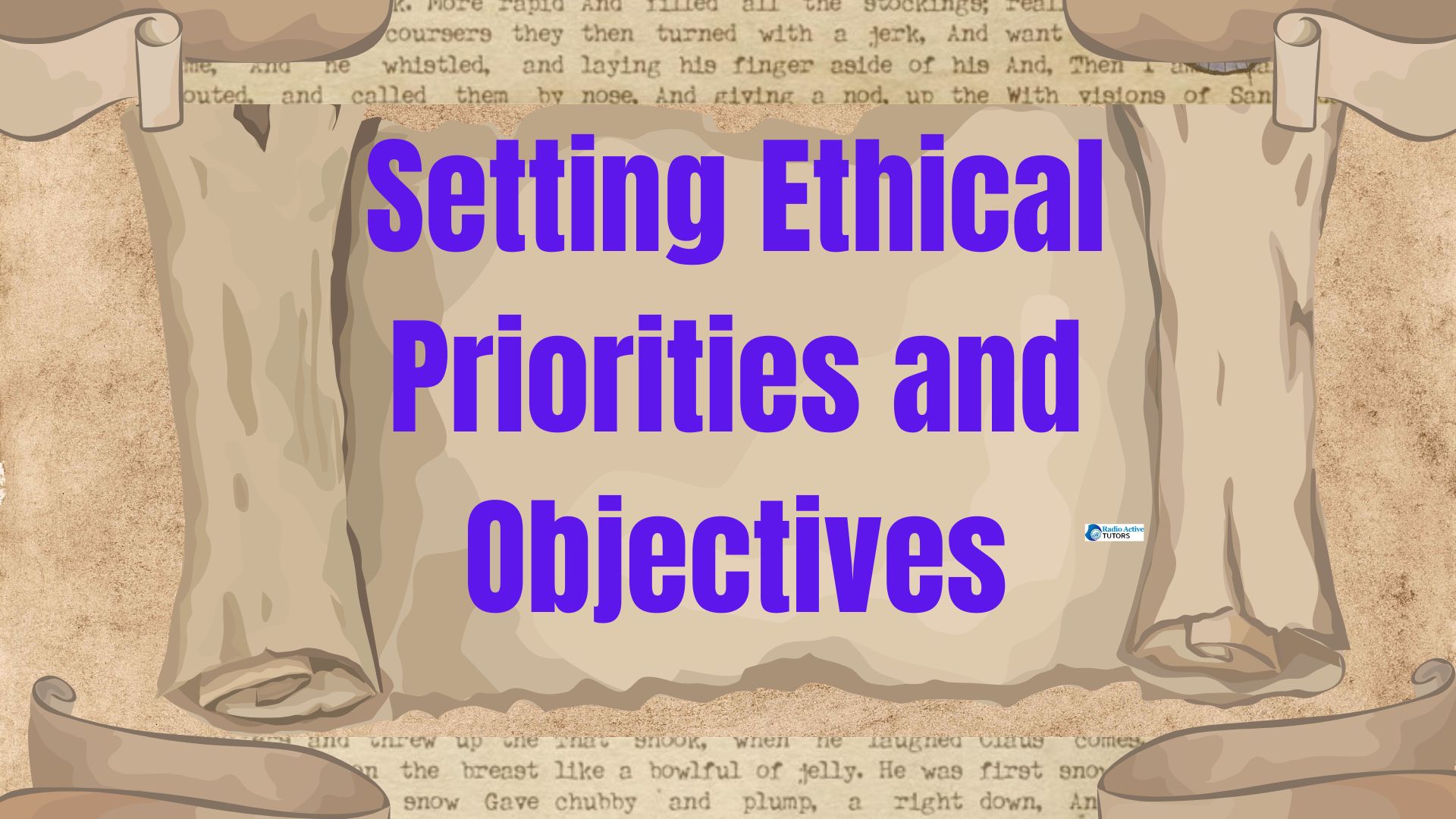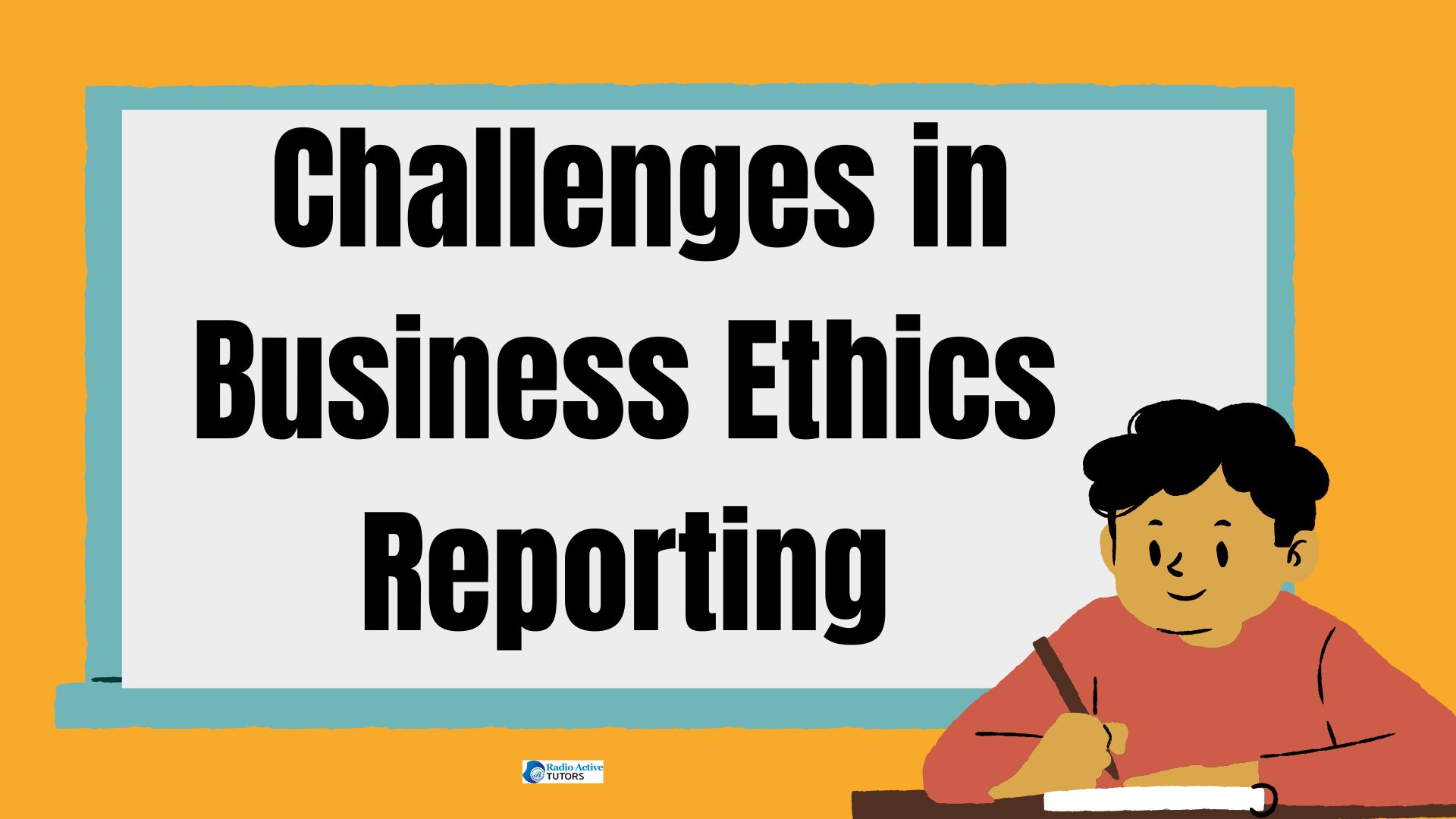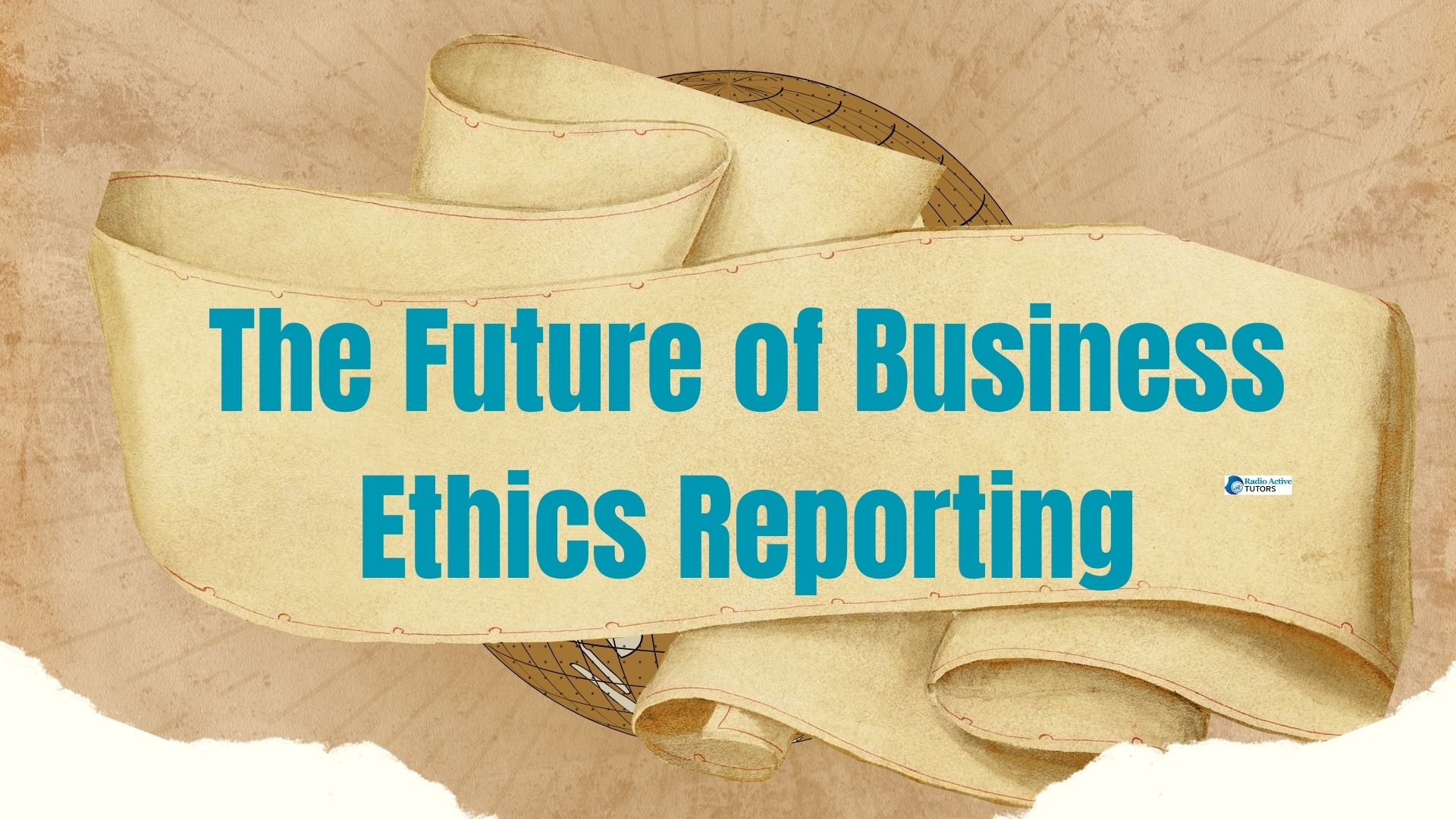Table of Contents
I. Introduction
II. Understanding Business Ethics Reports
III. Significance of Business Ethics Reports
IV. Crafting an Effective Business Ethics Report
V. Best Practices in Business Ethics Reporting
VI. Challenges in Business Ethics Reporting
VII. The Role of Technology in Business Ethics Reporting
VIII. Case Studies: Exemplary Business Ethics Reports
IX. Regulatory Frameworks and Guidelines for Business Ethics Reporting
X. The Future of Business Ethics Reporting
XI. Frequently Asked Questions (FAQs)
I. Introduction
A. Definition of Business Ethics Reports

Business ethics reports are comprehensive documents that outline the ethical principles, values, and standards upheld by an organization in its business practices. These reports serve as a roadmap for ensuring integrity, transparency, and accountability in all aspects of operations, including interactions with stakeholders, compliance with regulations, and decision-making processes. Within these reports, organizations typically define their ethical framework, articulate their commitment to ethical conduct, and provide insights into specific policies, procedures, and initiatives aimed at promoting ethical behavior throughout the organization.
Additionally, business ethics reports may include case studies, benchmarks, and performance indicators to assess the effectiveness of ethical practices and identify areas for improvement. Ultimately, these reports play a vital role in fostering trust, reputation, and sustainable growth by demonstrating a firm’s dedication to ethical business practices and responsible corporate citizenship.
II. Understanding Business Ethics Reports
A. What Constitutes a Business Ethics Report?
Understanding what constitutes a business ethics report involves recognizing its essential components and purpose. Essentially, a business ethics report serves as a comprehensive documentation of an organization’s commitment to ethical conduct and corporate responsibility. It typically includes an overview of the organization’s ethical principles, values, and code of conduct, outlining the standards expected from employees, management, and other stakeholders.
Moreover, these reports often detail specific ethical dilemmas faced by the organization, along with the strategies employed to address them. They may also provide insights into the company’s efforts to promote diversity, inclusion, environmental sustainability, and social responsibility. Through transparency and accountability, business ethics reports aim to uphold the organization’s reputation, build trust with stakeholders, and contribute to long-term ethical practices within the business environment.
B. Types of Business Ethics Reports
Understanding the different types of business ethics reports is essential for grasping the breadth and depth of ethical considerations within organizations. Business ethics reports can vary in scope and focus, catering to diverse stakeholders and addressing various aspects of ethical conduct. One common type is the annual ethics report, which provides a comprehensive overview of the organization’s ethical performance over a specific period, including accomplishments, challenges, and future goals. Another type is the sustainability report, which emphasizes the organization’s efforts to minimize its environmental footprint, promote social responsibility, and ensure long-term sustainability.
Additionally, there are compliance reports, which detail the organization’s adherence to legal and regulatory requirements, ensuring accountability and transparency in its operations. Moreover, incident-specific reports may be issued in response to ethical breaches or misconduct, outlining investigations, corrective actions, and preventive measures taken by the organization. By understanding the different types of business ethics reports, stakeholders can gain valuable insights into the organization’s commitment to ethical behavior and responsible business practices.
1. Internal Ethics Reports
Internal ethics reports play a crucial role in fostering a culture of integrity and accountability within organizations. These reports are designed to assess and monitor ethical standards and practices among employees, management, and other internal stakeholders. Internal ethics reports may include findings from ethical audits, employee surveys, and whistleblower complaints, providing insights into the organization’s ethical climate and identifying areas for improvement.
Additionally, they may document internal policies, procedures, and training programs aimed at promoting ethical behavior and compliance with ethical guidelines. By addressing ethical issues proactively and transparently, internal ethics reports contribute to the establishment of trust, employee morale, and organizational reputation. Moreover, they serve as a mechanism for identifying potential risks and mitigating ethical lapses before they escalate into more significant problems, ultimately supporting the organization’s long-term sustainability and success.
2. External Ethics Reports
External ethics reports serve as a means for organizations to communicate their ethical commitments and practices to external stakeholders, including customers, investors, regulators, and the public. These reports provide transparency into the organization’s ethical conduct, initiatives, and performance, thereby fostering trust and accountability with external audiences.
External ethics reports often include information on the organization’s corporate social responsibility (CSR) efforts, environmental sustainability practices, ethical sourcing policies, and community engagement activities. By publicly disclosing their ethical practices and performance, organizations demonstrate their dedication to responsible business practices and aligning with societal expectations. Additionally, external ethics reports may enhance the organization’s reputation, attract socially conscious investors, and differentiate the organization in the marketplace. Overall, external ethics reports play a vital role in promoting transparency, accountability, and trust between organizations and their external stakeholders.
C. Components of a Comprehensive Business Ethics Report

A comprehensive business ethics report comprises several key components essential for effectively communicating an organization’s ethical principles, practices, and performance. Firstly, an overview of the organization’s ethical framework and values sets the tone, providing context for the report’s contents. Next, a detailed discussion of specific ethical issues, challenges, and dilemmas faced by the organization demonstrates transparency and accountability. This section may include case studies, examples, and analysis of ethical decision-making processes. Additionally, the report should outline the organization’s policies, procedures, and initiatives aimed at promoting ethical behavior and compliance with ethical standards.
Information on the organization’s corporate social responsibility (CSR) efforts, environmental sustainability practices, and stakeholder engagement activities should also be included to provide a holistic view of the organization’s ethical commitment. Finally, a section on performance metrics and goals enables stakeholders to assess the organization’s progress and hold it accountable for ethical performance over time. By incorporating these components, a comprehensive business ethics report serves as a valuable tool for promoting transparency, accountability, and trust within and outside the organization.
III. Significance of Business Ethics Reports
A. Promoting Transparency and Accountability
Promoting transparency and accountability is a cornerstone of business ethics reports, as they serve as a conduit for organizations to demonstrate their commitment to ethical conduct and responsible business practices. By openly disclosing information about their ethical frameworks, values, policies, and performance, organizations foster trust with stakeholders and enhance their credibility. Transparency ensures that stakeholders have access to accurate and relevant information regarding the organization’s ethical standards and practices, enabling them to make informed decisions and hold the organization accountable for its actions.
Moreover, business ethics reports provide a platform for organizations to acknowledge ethical challenges and demonstrate their efforts to address them, thereby fostering a culture of accountability within the organization. Ultimately, by promoting transparency and accountability through business ethics reports, organizations not only uphold their ethical obligations but also contribute to building stronger relationships with stakeholders and maintaining the trust of the public.
B. Enhancing Corporate Reputation and Brand Image
Enhancing corporate reputation and brand image is a pivotal aspect of business ethics reports, as they provide organizations with an opportunity to showcase their commitment to ethical conduct and responsible business practices. By transparently disclosing information about their ethical frameworks, values, and performance, organizations bolster trust and credibility with stakeholders, including customers, investors, employees, and the wider community.
A positive reputation for ethical behavior not only attracts customers and investors who prioritize ethical considerations but also fosters loyalty and goodwill among existing stakeholders. Moreover, business ethics reports enable organizations to differentiate themselves in the marketplace by demonstrating a genuine commitment to social responsibility and ethical leadership. Ultimately, by enhancing corporate reputation and brand image through business ethics reports, organizations can strengthen their competitive advantage, attract top talent, and secure long-term success in an increasingly ethical-conscious business environment.
C. Mitigating Legal and Regulatory Risks
Mitigating legal and regulatory risks is a critical aspect underscored by business ethics reports, as they provide organizations with a platform to demonstrate compliance with laws, regulations, and ethical standards. By transparently disclosing information about their ethical frameworks, policies, and practices, organizations can proactively address potential legal and regulatory concerns. Business ethics reports serve as a mechanism for organizations to showcase their commitment to ethical conduct, thus reducing the likelihood of legal disputes and regulatory penalties.
Moreover, by identifying and addressing ethical lapses or compliance issues, organizations can prevent reputational damage and financial losses associated with legal and regulatory violations. Ultimately, by mitigating legal and regulatory risks through business ethics reports, organizations can safeguard their operations, protect their stakeholders, and uphold their commitment to ethical behavior and corporate responsibility.
D. Fostering Stakeholder Trust and Confidence
Fostering stakeholder trust and confidence is a paramount objective highlighted by business ethics reports, as they provide a transparent and comprehensive overview of an organization’s ethical principles, practices, and performance. By openly disclosing information about their ethical frameworks, values, and initiatives, organizations can build credibility and enhance relationships with stakeholders, including customers, investors, employees, suppliers, and the broader community. Business ethics reports serve as a tangible demonstration of an organization’s commitment to integrity, responsibility, and accountability, thereby instilling trust and confidence among stakeholders.
Through transparent communication of ethical standards and practices, organizations can align with stakeholder expectations, address concerns, and foster a sense of partnership and collaboration. Ultimately, by fostering stakeholder trust and confidence through business ethics reports, organizations can strengthen their reputation, build stronger relationships, and achieve sustainable long-term success in an increasingly competitive and ethical-conscious business environment.
IV. Crafting an Effective Business Ethics Report
A. Setting Ethical Priorities and Objectives

Crafting an effective business ethics report entails setting clear ethical priorities and objectives that align with the organization’s values and goals. This involves identifying key ethical issues and challenges faced by the organization and prioritizing them based on their significance and potential impact. By establishing ethical priorities, organizations can focus their efforts on addressing the most pressing concerns and allocating resources effectively.
Additionally, setting ethical objectives enables organizations to define specific goals and initiatives aimed at promoting ethical behavior and improving ethical performance. These objectives should be measurable, achievable, and aligned with the organization’s overall mission and strategic objectives. By setting ethical priorities and objectives, organizations demonstrate their commitment to integrity, transparency, and accountability, laying the foundation for a robust and credible business ethics report.
B. Collecting Relevant Data and Information
Collecting relevant data and information is a crucial step in crafting an effective business ethics report. This process involves gathering comprehensive and accurate data related to the organization’s ethical practices, performance, and impact. It includes collecting information from various sources, such as internal documents, policies, procedures, and external stakeholders.
Additionally, conducting surveys, interviews, and assessments can provide valuable insights into employees’ perceptions, attitudes, and behaviors regarding ethical issues. Furthermore, analyzing relevant metrics, such as ethical compliance rates, incident reports, and stakeholder feedback, helps in evaluating the organization’s ethical performance and identifying areas for improvement. By collecting relevant data and information, organizations can ensure that their business ethics report is thorough, credible, and informative, enabling stakeholders to make informed decisions and hold the organization accountable for its ethical conduct.
C. Analyzing Ethical Performance Metrics
Analyzing ethical performance metrics is a critical aspect of crafting an effective business ethics report. This process involves evaluating various indicators and measures to assess the organization’s adherence to ethical standards and its overall ethical performance. Ethical performance metrics may include data on ethical compliance rates, employee training completion, whistleblower reports, and customer satisfaction surveys related to ethical conduct.
By analyzing these metrics, organizations can identify trends, patterns, and areas of concern, enabling them to address ethical lapses or deficiencies proactively. Furthermore, comparing current performance against established benchmarks or industry standards provides valuable context for evaluating progress and setting realistic goals for improvement. Ultimately, analyzing ethical performance metrics in a business ethics report demonstrates the organization’s commitment to transparency, accountability, and continuous improvement in ethical practices.
D. Formulating Actionable Recommendations
Formulating actionable recommendations is a crucial aspect of crafting an effective business ethics report. After analyzing data and assessing ethical performance metrics, organizations must translate their findings into concrete steps for improvement. This process involves identifying specific areas where the organization can enhance its ethical practices, mitigate risks, and strengthen its ethical culture. Actionable recommendations should be practical, feasible, and tailored to address the organization’s unique challenges and opportunities.
Moreover, they should be accompanied by clear action plans, timelines, and responsible parties to ensure accountability and implementation. By formulating actionable recommendations, organizations demonstrate their commitment to continuous improvement and ethical excellence, fostering trust and confidence among stakeholders. Additionally, these recommendations serve as a roadmap for guiding future initiatives and advancing the organization’s ethical objectives. Ultimately, incorporating actionable recommendations in a business ethics report empowers organizations to translate ethical principles into tangible actions that drive positive change and uphold their commitment to integrity and responsibility.
V. Best Practices in Business Ethics Reporting
Best practices in business ethics reporting encompass several key principles aimed at ensuring transparency, accountability, and credibility in communicating an organization’s ethical performance. Firstly, adherence to established standards and guidelines for ethical reporting, such as those outlined by organizations like the Global Reporting Initiative (GRI) or the International Integrated Reporting Council (IIRC), is essential. Secondly, business ethics reports should be comprehensive and balanced, providing a thorough overview of the organization’s ethical framework, practices, challenges, and achievements.
Thirdly, engaging stakeholders throughout the reporting process by soliciting feedback, incorporating their perspectives, and addressing their concerns helps enhance the report’s relevance and credibility. Moreover, clear and concise communication of data, findings, and recommendations is crucial for ensuring that stakeholders can easily understand and act upon the information presented in the report. Finally, regular review and updates of business ethics reports to reflect changes in the organization’s ethical practices, regulatory requirements, and stakeholder expectations ensure that the reports remain relevant and impactful over time. By following these best practices, organizations can effectively communicate their commitment to ethical behavior and accountability, thereby strengthening trust and confidence among stakeholders.
VI. Challenges in Business Ethics Reporting

Challenges in business ethics reporting can arise from various factors, including complexity, subjectivity, and potential conflicts of interest. One significant challenge is the difficulty in quantifying and measuring ethical performance objectively, as ethical considerations often involve qualitative judgments that may vary among stakeholders. Moreover, navigating the balance between transparency and confidentiality can be challenging, particularly when disclosing sensitive information related to ethical breaches or investigations. Additionally, ensuring the accuracy and reliability of data and information included in the report requires robust systems for data collection, verification, and validation.
Furthermore, addressing stakeholder expectations and balancing competing interests while maintaining the integrity and credibility of the report presents another challenge. Finally, keeping pace with evolving regulatory requirements, emerging ethical issues, and changing stakeholder expectations requires organizations to adapt and innovate their reporting practices continuously. Despite these challenges, organizations can overcome them by adopting best practices, fostering transparency and accountability, and engaging stakeholders in the reporting process.
VII. The Role of Technology in Business Ethics Reporting
The role of technology in business ethics reporting is becoming increasingly significant, revolutionizing the way organizations collect, analyze, and communicate ethical data and information. Technology enables organizations to streamline data collection processes, automate data analysis, and enhance the accuracy and reliability of information included in business ethics reports. Additionally, advanced analytics tools and data visualization techniques allow organizations to uncover insights, trends, and patterns in ethical performance metrics more effectively.
Furthermore, technology facilitates greater transparency and accessibility in reporting by enabling organizations to publish interactive and multimedia-rich reports online, reaching a broader audience of stakeholders. Moreover, emerging technologies such as blockchain offer opportunities to enhance the transparency and traceability of ethical data, particularly in supply chain management and corporate governance. Ultimately, leveraging technology in business ethics reporting enables organizations to improve accountability, transparency, and trust with stakeholders while staying ahead of evolving regulatory requirements and societal expectations.
VIII. Case Studies: Exemplary Business Ethics Reports
Case studies showcasing exemplary business ethics reports serve as valuable benchmarks for organizations seeking to enhance their own reporting practices. These reports demonstrate best-in-class examples of transparency, accountability, and integrity in communicating an organization’s ethical principles, practices, and performance. By analyzing case studies of successful business ethics reports, organizations can gain insights into effective reporting strategies, innovative approaches to data collection and analysis, and impactful communication techniques.
Moreover, these case studies highlight how organizations have navigated complex ethical dilemmas, addressed stakeholder concerns, and implemented proactive measures to promote ethical behavior and compliance. By drawing inspiration from exemplary business ethics reports, organizations can strengthen their own reporting practices, build trust with stakeholders, and demonstrate their commitment to ethical conduct and corporate responsibility.
IX. Regulatory Frameworks and Guidelines for Business Ethics Reporting
Regulatory frameworks and guidelines play a crucial role in shaping business ethics reporting practices, providing organizations with a structured framework for transparency, accountability, and compliance. Various regulatory bodies and industry associations worldwide have established standards and guidelines for ethical reporting, such as the Global Reporting Initiative (GRI), the International Integrated Reporting Council (IIRC), and the Sustainability Accounting Standards Board (SASB).
These frameworks outline principles, methodologies, and disclosure requirements for reporting on ethical issues, including corporate governance, social responsibility, environmental sustainability, and stakeholder engagement. Adhering to these regulatory frameworks helps organizations ensure consistency, comparability, and credibility in their business ethics reports, enabling stakeholders to make informed decisions and hold organizations accountable for their ethical conduct. Moreover, compliance with regulatory requirements demonstrates an organization’s commitment to ethical behavior and responsible corporate citizenship, enhancing its reputation and trustworthiness in the eyes of stakeholders and the public.
X. The Future of Business Ethics Reporting

The future of business ethics reporting holds promise for continued evolution and innovation, driven by advancements in technology, shifting stakeholder expectations, and emerging ethical considerations. With increasing scrutiny on corporate conduct and social responsibility, business ethics reporting is likely to become more comprehensive, transparent, and integrated into overall corporate reporting frameworks. Stakeholders, including investors, consumers, employees, and regulators, are demanding greater accountability and transparency from organizations, pushing for more robust ethical reporting practices.
Additionally, emerging technologies such as blockchain and artificial intelligence may revolutionize how organizations collect, analyze, and report on ethical data, enhancing accuracy, reliability, and transparency. Moreover, as global challenges such as climate change, social inequality, and ethical supply chain management continue to gain prominence, business ethics reporting will likely expand to encompass a broader range of ethical considerations. Ultimately, the future of business ethics reporting lies in its ability to adapt to evolving regulatory requirements, societal expectations, and technological advancements, while maintaining its role as a catalyst for accountability, transparency, and responsible corporate behavior.
XI. Frequently Asked Questions (FAQs)
A. What is the purpose of a business ethics report?
B. How often should businesses publish ethics reports?
C. What are the key components of a comprehensive ethics report?
D. How can companies ensure the accuracy of their ethics data?
E. What are the consequences of unethical reporting practices?
F. How do business ethics reports impact investor decisions?
G. Are there any industry-specific standards for ethics reporting?
H. How can small businesses benefit from ethics reporting?
I. What role does stakeholder engagement play in ethics reporting?
J. What are the future trends shaping the field of ethics reporting?
